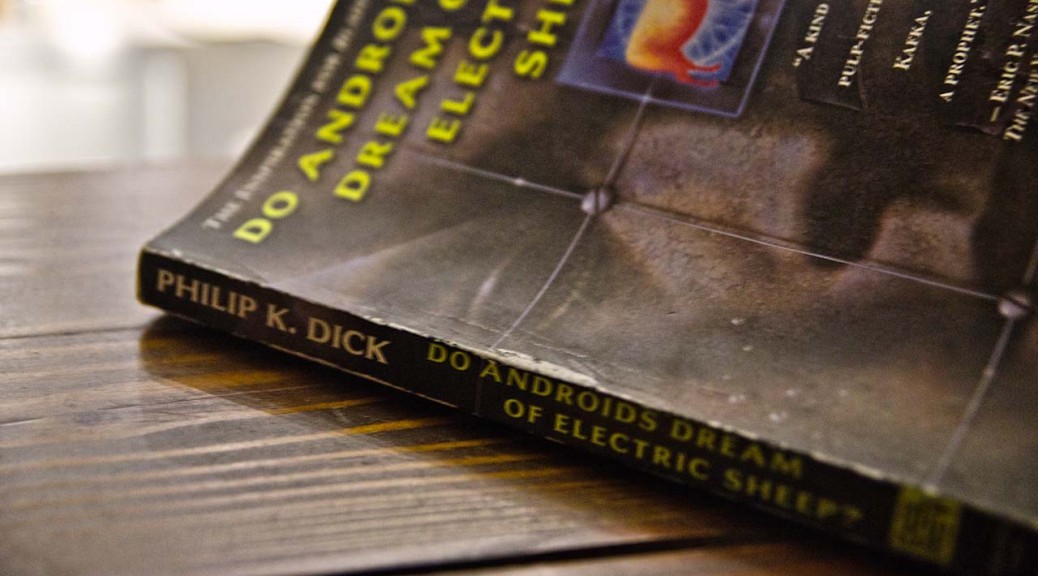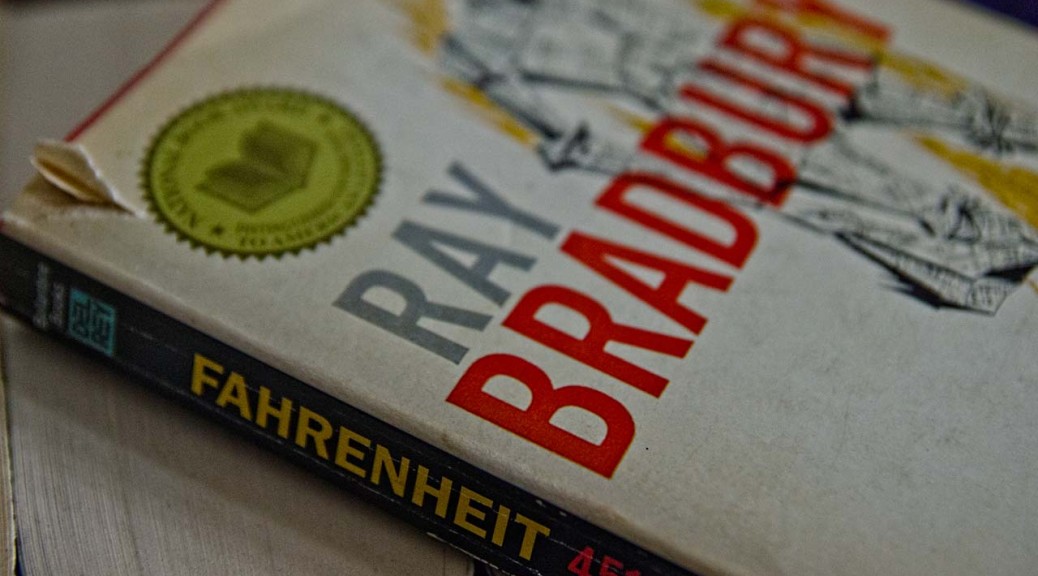Watched Kumiko, the Treasure Hunter (2014). Dir. David Zellner. DP: Sean Porter. Music: The Octopus Project.
Tag Archives: cinema

Do Androids Dream of Electric Sheep?
Dick, Philip K. Do Androids Dream of Electric Sheep? New York: Del Rey, 1996. (First. ed 1968)
“But a mood like that,” Rick said, “you’re apt to stay in it, not dial your way out. Despair like that, about total reality, is self-perpetuating.” p. 6
“First, strangely, the owls had died. At the time it had seemed almost funny, the fat, fluffy white birds lying here and there, in yards and on streets; coming out no earlier than twilight, as they had while alive, the owls escaped notice. Medieval plagues had manifested themselves in similar way, in the form of many dead rats. This plague, however, had descended from above.” p. 15-16
“An android, no matter how gifted as to pure intellect capacity, could make no sense out of the fusion which took place routinely among the followers of Mercerism–an experience which he, and virtually everyone else, including subnormal chickenheads, managed with no difficulty.” p. 30
“Empathy, evidently, existed only within the human community, whereas intelligence to some degree could be found throughout every phylum and order including the arachnida. For one thing, the empathic faculty probably required an unimpaired group instinct; a solitary organism, such as a spider, would have no use for it; in fact it would tend to abort a spider’s ability to survive.” p. 30-31.
“Because, ultimately, the empathic gift blurred the boundaries between hunter and victim, between the successful and the defeated.” p. 31
“It retiring–i.e., killing–and andy, he did not violate the rule of life laid down by Mercer. You shall kill only the killers, Mercer had told them the year empathy boxes first appeared on Earth.” p. 31
“For Rick Deckard an escaped humanoid robot, which had killed its master, which had been equipped with an intelligence greater than that of many human beings, which had no regard for animals, which possessed no ability to feel empathic joy for another life form’s success or grief at its defeat–that, for him, epitomized The Killers. p. 32
“She indicated the owl dozing on its perch; it had briefly opened both eyes, yellow slits which healed over as the owl settled back down to resume its slumber.” p. 43
“Kipple is useless objects, like junk mail or match folders after you use the last match or gum wrappers or yesterday’s homeopage. When nobody’s around, kipple reproduces itself. For instance, if you go to bed leaving any kipple around your apartment, when you wake up the next morning there’s twice as much of it. It always gets more and more.” p. 65
***””No one can win against kipple,” he said, “except temporarily and maybe in one spot, like in my apartment I’ve sort of created stasis between the pressure of kipple and nonkipple, for the time being. But eventually I’ll die or go away, and then the kipple will again take over. It’s a universal principle operating throughout the universe; the entire universe is moving toward a final state of total, absolute kippleization.” He added, “Except of course for the upward climb of Wilbur Mercer.”” p. 65-66
“Every day he declined in sagacity and vigor. He and the thousands of other specials throughout Terra, all of them moving toward the ash heap. Turning into living kipple.” p. 73
“This rehearsal will end, the performance will end, the singers will die, eventually the last score of the music will be destroyed in one way or another; finally the name “Mozart” will vanish, the dust will have won.” p. 98
“An android,” he said, “doesn’t care what happens to another android. That’s one of the indications we look for.” p. 101
quondam
“disemelevatored” p. 126
Edvard Munch

Edvard Munch | The Scream (1893)
“The creature stood on a bridge and no one else was present; the creature screamed in isolation. Cut off by–or despite–its outcry.” p. 130

Edvard Munch | Puberty (1894-95)
Puberty. 1894-95 p. 131, 133
“She was really a superb singer, he said to himself as he hung the receiver, his call completed. It don’t get it; how can a talent like that be a liability to our society? But it wasn’t the talent, he told himself; it was she herself.” p. 137
“”You realize,” Phil Resch said quietly, “what this would do. If we include androids in our range of empathic identification, as we do animals.”
“We couldn’t protect ourselves.”” p. 141
“He had an indistinct, glimpsed darkly impression: of something merciless that carried a printed list and a gun, that moved machine-like through the flat, bureaucratic job of killing. A thing without emotions, or even a face; a thing that if killed got replaced immediately by another resembling it. And so on, until everyone real and alive had been shot.” p. 158
“But what does it matter to me? I mean, I’m a special; they don’t treat me very well either,” p. 163 (Isidore to Roy Baty)
“Rick said, “I took a test, one question, and verified it; I’ve begun to emphathize with androids,” p. 174
“The old man said, “You will be required to do wrong no matter where you go. It is the basic condition of life, to be required to violate your own identity. At some time, every creature which lives must do so. It is the ultimate shadow, the defeat of creation” p. 179
“Mercer talked to me but it didn’t help. He doesn’t know any more than I do. He’s just an old man climbing a hill to his death.” p. 179
“Do androids dream? Rick asked himself. Evidently: that’s why they occasionally kill their employers and flee here. A better life, without servitude.” p. 184
“this android stole, and experimented with, various mind-fusing drugs, claiming when caught that it hoped to promote in an androids a group experience similar to that of Mercerism,” p. 185
“Because without the Mercer experience we just have your word that you feel this empathy business” p. 209
“”The legs of toads are weak,” Rick said. “That’s the main difference between a toad and a frog, that an water. A frog remains near water but a toad can live in the desert” p. 240
“”The killers that found Mercer in his sixteenth year, when they told him he couldn’t reverse time and bring things back to life again. So now all he can do is move along with life, going where it goes, to death.” p. 242
Stanley Kubrick: Interviews, and BIFF Cinema Library
Found the Cinema Library at BIFF hill. shhhhh. no backpacks.
Stanley Kubrick Interviews by Gene D. Phillips.
“Kubrick is fiercely concerned with the accuracy of the small details that make up the background of his films, because he feels that helps the audience to believe what they see on screen.” viii
“Kubrick sometimes nursed ideas over long periods before he was able to bring them to fruition.” viii
“directing a film can be like trying to write War and Peace in a bumper car at an amusement park, when you finally get it right, there are not many joys in life that can equal that feeling.” p. xii
Dream Story by Arthur Schnitzler
Clean Break by Lionel White
To Read at the library:
book of essays and interviews on Wes Anderson
World Cinema by Geoffrey Nowell-Smith
John Ford
Planet Hong Kong by David Bordwell
Print the Legend: The Life and Times of John Ford by Scott Eyman
The Passion of David Lynch
books on Stanley Kubrick
Interviews with Scorsese, Ridley Scott, Kubrick, Bertolucci, Michael Mann.
books on Kurosawa
Lock, Stock and Two Smoking Barrels screenplay
Mediated Sex: Pornography and Postmodern Culture.
Goodfellas script
books on Cinematography
Eyes Wide Shut screenplay
The Making of Blade Runner
Boogie Nights script
Dark City (book on film noir)

Fahrenheit 451 | I
Bradbury, Ray. Fahrenheit 451. New York: Del Rey, 1991. (First Ed. 1953.)
“One time, as a child, in a power failure, his mother had found and lit a last candle and there had been a brief hour of rediscovery, of such illumination that space lost its vast dimensions and drew comfortably around them, and they, mother and son, alone, transformed, hoping that the power might not come on again too soon…” p. 7
“It was like coming into the cold marbled room of a mausoleum after the moon has set. Complete darkness, not a hint of the silver world outside, the windows tightly shut, the chamber a tomb world where no sound from the great city could penetrate.” p. 11
“He felt that the stars had been pulverized by the sound of the black jets and that in the morning the earth would be covered with their dust like a strange snow.” p. 14
“Montag’s hand closed like a mouth, crushed the book with wild devotion, with an insanity of mindlessness to his chest. The men above were hurling shovelfuls of magazines into the dusty air. They fell like slaughtered birds and the woman stood below, like a small girl, among the bodies.” p. 37

Hugh Latimer and Nicholas Ridley martyred by being burnt at the stake. John Foxe’s book of martyrs. 1563 edition. Via Wikimedia.
“”‘We shall this day light such a candle, by God’s grace, in England, as I trust shall never be put out,'” said Beatty…. “A man named Latimer said that to a man named Nicholas Ridley, as they were being burnt alive at Oxford, for heresy, on October 16, 1555.”” p. 40
“”I had a nice evening,” She said, in the bathroom.
“What doing?”
“The parlor.”
“What was going on?”
“Programs.”
“What programs?”
“Some of the best ever.”
“Who?”
“Oh, you know, the bunch.”” p. 49
“The parlor was exploding with sound.
“We burnt copies of Dante and Swift and Marcus Aurelius.”
“Wasn’t he European?”
“Something like that.” p. 50
“And I thought about books. And for the first time I realized that a man was behind each one of the books. A man had to think them up. A man had to take a long time to put them down on paper. And I’d never even thought that thought before.” p. 52
“Books cut shorter. Condensations. Digests. Tabloids. Everything boils down to the gag, the snap ending.”
“Snap ending,” Mildred nodded.
“Classics cut to fit fifteen-minute radio shows, then cut again to fill a two-minute book column, winding up at last as a ten- or twelve-line dictionary resume.” p. 54
“Speed up the film, Montag, quick. Click, Pic, Look, Eye, Now, Flick, Here, There, Swift, Pace, Up, Down, In, Out, Why, How, Who, What, Where, Eh? Uh! Bang! Smack! Wallop, Bing, Bong, Boom! Digest-digests, digests-digests-digests. Politics? One column, two sentences, a headline! Then, in midair, all vanishes! Whirl man’s mind around about so fast under the pumping hands of publishers, exploiters, broadcasters that the centrifuge flings off all unnecessary, time-wasting thought!” p. 55
“The bigger your market, Montag, the less you handle controversy, remember that!” p. 57
“With school turning out more runners, jumpers, racers, tinkerers, grabbers, snatchers, fliers, and swimmers instead of examiners, critics, knowers, and imaginative creators, the word ‘intellectual,’ of course, became the swear word it deserved to be.” p. 58
“We must all be alike. Not everyone born free and equal, as the Constitution says, but everyone made equal. Each man the image of every other; then all are happy, for there are no mountains to make them cower, to judge themselves against.” p. 58
“”Colored people don’t like Little Black Sambo. Burn it. White people don’t feel good about Uncle Tom’s Cabin. Burn it. Someone’s written a book on tobacco and cancer of the lungs? The cigarette people are weeping? Burn the book.”” p. 59
“If you don’t want a man unhappy politically, don’t give him two sides to a question to worry him; give him one. Better yet, give him none. Let him forget there is such a thing as war. If the goverment is inefficient, topheavy, and tax-mad, better it be all those than that people worry over it. Peace, Montag. Give the people contests they win by remembering the words to more popular songs or the names of state capitals or how much corn Iowa grew last year. Cram them full of noncombustible date, chock them so damned full of ‘facts’ they feel stuffed, but absolutely ‘brilliant’ with information. Then they’ll feel they’re thinking, they’ll get a sense of motion without moving.” p. 61
“the real reason, hidden underneath, might be they didn’t want people sitting like that, doing nothing, rocking, talking; that was the wrong kind of social life. People talked too much. And they had time to think.” p. 63
“”‘We cannot tell the precise moment when friendship is formed. As in filling a vessel drop by drop, there is at last a drop which makes it run over; so in a series of kindnesses there is at last one which makes the heart run over.'”” p. 71
“Books were only one type of receptacle where we stored a lot of things we were afraid we might forget. There is nothing magical in them at all. The magic is only in what books say, how they stitched the patches of the universe together into one garment for us.” p. 82-83
“That’s my definition, anyway. Telling detail. Fresh detail. The good writers touch life often. The mediocre ones run a quick hand over her. The bad ones rape her and leave her for the flies.” p. 83
“Number one, as I said: quality of information. Number two: leisure to digest it. And number three: the right to carry out actions based on what we learn from the interaction of the two.” p. 84-85
“The things you’re looking for, Montag, are in the world, but the only way the average chap will ever see ninety-nine per cent of them is in a book.” p. 86
“A minute later, Three White Cartoon Clowns chopped off each other’s limbs to the accompaniment of immense incoming tides of laughter. Two minutes more and the room whipped out of town to the jet cars wildly circling an arena, bashing and backing up and bashing each other again. Montag saw a number of bodies fly in the air.” p. 94
“Fat, too, and didn’t dress to hide it. No wonder the landslide was for Winston Noble. Even their names helped. Compare Winston Noble to Hubert Hoag for ten seconds and you can almost figure the results.” p. 97
“By the time I was forty my blunt instrument had been gone to a fine cutting point for me. If you hide your ignorance, no one will hit you and you’ll never learn.” p.104
to read:
Martian Chronicles (1950)
To watch: Fahrenheit 451 (1966) | Dir. François Truffaut |
South Park
South Park (1997-) Trey Parker and Matt Stone.
Kirk Baxter & Angus Wall | Film Editors
Angus Wall and Kirk Baxter
Angus Wall
Seven (1995) David Fincher title designer
Fight Club (1999) David Fincher editorial consultant
Architecture of Reassurance (1999) Mike Mills [short]
Panic Room (2002) David Fincher
Carnivàle TV series (2003-2005) Title design
See title sequence
Thumbsucker (2005) Mike Mills
Rome TV series (2005-2007) Title design
Zodiac (2007) David Fincher
Game of Thrones (2011-) Title design
Angus Wall and Kirk Baxter
The Curious Case of Benjamin Button (2008) David Fincher
The Social Network (2010) David Fincher
The Girl with the Dragon Tattoo (2011) David Fincher
Kirk Baxter
Gone Girl (2015) David Fincher
Parallax Photo Effect
First saw this effect being used with still photos in Cocaine Cowboys (2006) Billy Corben
Dispatches
Michael Herr
Dispatches (1977), Apocalypse Now script (1979), Full Metal Jacket script (1987), and an early draft of The Island of Dr. Moreau (1996).

Dark Roads
Concept similarities between music videos from Radiohead, Chet Faker and Bat for Lashes.
Chet Faker’s Gold (2014). Smooth, robotic camera, panning and tilting over a night road lit by headlights.
Director: Hiro Murai
DP: Larkin Seiple
much like Karma Police (1997).
the car in both videos is similar in style (1976 Chrysler New Yorker in Karma Police).
Directed by Jonathan Glazer
Or perhaps Bat for Lashes‘ What’s A Girl To Do
Bat For Lashes – What’s A Girl To Do from Blink on Vimeo.
Directed by Dougal Wilson | Blink Productions
David Lynch‘s Lost Highway, (1997).
———-
Chet Faker. Talk is Cheap (2014).
Directed by Toby & Pete
www.tobyandpete.com
DP: Dan Freene
Camera angle, set up, and progression. Similar point of view with different interpretations of the passing of time.
Radiohead. No Surprises (1998)
Directed by Grant Gee
See imvb article
More on Murai